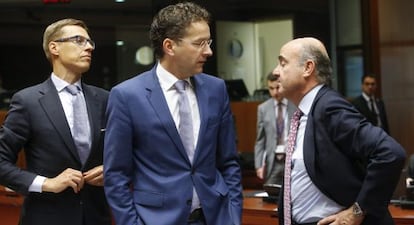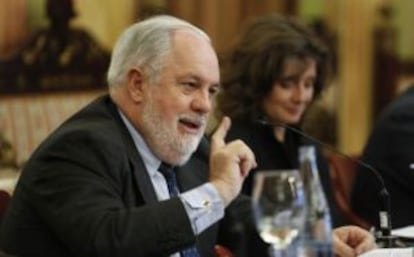Is Spain’s influence on the international stage waning?
Failure of country’s bid to head the Eurogroup highlights the lack of Spaniards in key posts

Now that Spain has lost its bid to head the Eurogroup – the meeting of Europe’s finance ministers – the Popular Party (PP) government of Prime Minister Mariano Rajoy is taking aim at the next agency with a chairmanship up for grabs: the European Stability Mechanism (ESM), the union’s own bailout fund.
The recent Eurogroup fiasco has served to underscore the lack of Spaniards in key EU positions, and in international organizations in general.
Although the Spanish presence in high-ranking European institutions has grown in recent years and now represents over eight percent of the total, there is a conspicuous absence of Spanish nationals in the more politically relevant positions.
Securing international posts requires “a sustained and shared effort” by political parties, says Rafael Estrella of the Spanish Elcano Royal Institute
The presence of figures such as Javier Solana, who was secretary general of NATO and the EU’s High Representative for Foreign Affairs and Security Policy; Federico Mayor Zaragoza, former director general of UNESCO; and even Rodrigo Rato, who was managing director of the International Monetary Fund (IMF), are a thing of the past.
These days, no Spaniard is at the helm of any major world body.
Spanish Socialist Party leader Pedro Sánchez is surely exaggerating when he compares Spain’s institutional presence with that of Cyprus. But Spain has cause to feel jealous of neighboring Portugal, who not only had José Manuel Durão Barroso as the previous head of the European Commission, but is also home to the current vice-president of the European Central Bank (ECB), Vítor Constancio.
Perhaps the biggest blow to Spain was losing a seat on the ECB’s executive committee in July 2012 when it seemed a done deal. Prime Minister Rajoy said the post had already been lost when he reached power in November 2011 but, according to EU sources, it was the Spanish government’s decision to switch candidates – replacing economist José Manuel Campa with former General Counsel at the European Central Bank, Antonio Sainz de Vicuña – that triggered the vote against Spain.
The germ of a European IMF?
The European Stability Mechanism (ESM), which Spain hopes to lead, is a bailout fund created to provide financial support to euro-zone countries and recapitalize their banks. Since its creation in 2012, it has been headed by Germany's Klaus Regling, whose five-year term theoretically expires in 2017. It is a purely technical post, but experts believe it will take on added meaning if the ESM becomes the germ of a future agency modeled after the International Monetary Fund (IMF).
Madrid hopes to get that seat back, but will have to wait until 2018 to do so.
Not everybody agrees with this negative view of Spanish diplomacy. Foreign Minister José Manuel García-Margallo denies that Spain has lost influence in the EU and highlights its role in leading European relations with Latin America and the Mediterranean region. He says it is “a remarkable simplification” to reduce everything to the recent Eurogroup failure.
According to foreign ministry figures, 8.2 percent of top-tier EU government workers are Spanish, nearly a whole point above the 7.3 percent quota assigned by the European Commission based on the country’s population, number of Council votes and seats in the European Parliament.
Four of the 38 directors general who work for the European Commission are Spanish, including those serving in the key Legal Service and Budget departments. Eleven percent of executive positions at the European External Action Service are held by Spaniards, and 15 of the EU’s ambassadors and two adjuncts are Spanish, a figure only surpassed by France. The executive director of the European Defense Agency, Jorge Domecq, is also Spanish.
In other words, there are growing numbers of Spaniards at the top of the EU ladder, but they are missing from the most visible posts, those with the greatest political clout.
This trend is not exclusive to the EU. At the United Nations, the best-placed Spaniard is Cristina Gallach, the Under-Secretary-General for Communications and Public Information. Former Barcelona mayor Joan Clos is the executive director for UN Habitat and Bernardino León is the UN Secretary General representative to Libya.
Rafael Estrella, vice-president of the Spanish Elcano Royal Institute think-tank, says that landing international posts requires “a strategy and a sustained and shared effort” by the various political parties, something that has been so far lacking.

The Socialists voted against PP official Miguel Arias Cañete when he was running for energy commissioner before the European Parliament, and did not lift a finger to make Europe’s Social Democrats support Economy Minister Luis de Guindos’ bid for the Eurogroup presidency, the government says.
The PP’s own attitude towards former Socialist ministers who end up in international positions was summed up by congressional spokesman Rafael Hernando last Wednesday, when he stated that “the success of a country does not depend on the number of nationals in high-ranking international positions, much less if we are talking about people such as Ms [Bibiana] Aído, Mr [Joan] Clos or Ms [Leire] Pajín [...] And that’s without even mentioning Ms [Magdalena] Álvarez, who had to leave the European Investment Bank over corruption.”
Bibiana Aído and Leire Pajín were ministers under former Socialist prime minister José Luis Rodríguez Zapatero. Aído caused national hilarity in June 2008 when she addressed parliament as “miembros y miembras” (the latter word, the feminine form of the Spanish for “members,” does not exist), while Pajín was criticized for being appointed health minister despite lacking a university degree.
Yet consensus has been proven to bear fruit. Spain’s successful bid for a rotating seat on the UN Security Council was initiated by Zapatero and ended by Rajoy. And the choice of the Socialist Bernardino León as Libya mediator was backed by Foreign Minister Margallo.
English version by Susana Urra.
Tu suscripción se está usando en otro dispositivo
¿Quieres añadir otro usuario a tu suscripción?
Si continúas leyendo en este dispositivo, no se podrá leer en el otro.
FlechaTu suscripción se está usando en otro dispositivo y solo puedes acceder a EL PAÍS desde un dispositivo a la vez.
Si quieres compartir tu cuenta, cambia tu suscripción a la modalidad Premium, así podrás añadir otro usuario. Cada uno accederá con su propia cuenta de email, lo que os permitirá personalizar vuestra experiencia en EL PAÍS.
¿Tienes una suscripción de empresa? Accede aquí para contratar más cuentas.
En el caso de no saber quién está usando tu cuenta, te recomendamos cambiar tu contraseña aquí.
Si decides continuar compartiendo tu cuenta, este mensaje se mostrará en tu dispositivo y en el de la otra persona que está usando tu cuenta de forma indefinida, afectando a tu experiencia de lectura. Puedes consultar aquí los términos y condiciones de la suscripción digital.









































